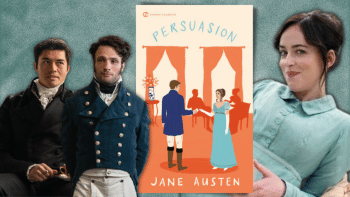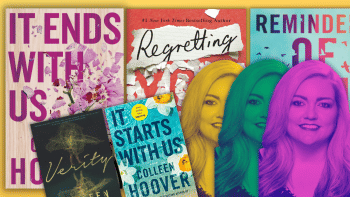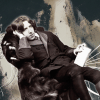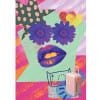Musings of a romance reader

My affinity for the romance genre was decided at an early age. From fawning over the Disney fairytales with my friends to lazy afternoons spent watching old movies, mesmerised by the likes of Uttam and Suchitra, ensured a unique exposure to amalgamation of pop culture. So, once the love of reading found me, gravitating towards the romance genre was inevitable.
The young adult series The Princess Diaries (HarperTrophy, 2000) by May Cabot was my first foray into any sort of romance during my preteens. However, Bronte and Austen were the gateway to my fascination for not only romance genre, but also a particular brand within it, mostly featuring Byronic heroes with a touch of dark, broody and mysterious demeanors. Add some banter, troubled past, a mix of possessiveness and jealousy—and you had me at hello.
Although I grew to admire other Austen heroes like Mr. Knightley from Emma (1815) and Mr. Wentworth from Persuasion (1817) much later, it was Mr. Darcy who embodied peak male attractiveness at that age for me, bolstered by the visual of Colin Firth's portrayal of the prickly hero in the BBC adaptation of Pride and Prejudice (1813). The intensity of the Bronte heroes, on the other hand, personified the Byronic trait to me. While Mr. Rochester, for me, was the only redeemable quality of Jane Eyre (Smith, Elder & Co. 1847), a book whose plot and pacing underwhelmed, Heathcliff, despite being an anti-hero, made Wuthering Heights (1847) far more interesting to me with his volatility. Gone with the Wind (Warner Books, 1999) was an emotional fare, leaving me heartbroken with the departing lines of Rhett Buttler, who I rooted for despite his Machiavellian and conniving ways. The aloof Maxim De Winter from Daphne du Maurier's Rebecca (1938) and insolent Mr. Thornton from North and South (1855) by Elizabeth Gaskell also made it to the list of fictional men as objects of my teenage affection.
My teenage obsession with what the contemporary readers refer to as "alpha males" could be called a temporary phase, and nothing extraordinary to write home about. However, the romance genre continues to be a source of comfort now even after more than a decade. The only difference is that age and experience has enabled me to identify the implications and gender politics underlying the romance. Be it Rhett Buttler or Heathcliff, the problematic aspects of their actions do not elude me anymore. This self-awareness is a result of a long-fostered academic and theoretical reading habit formed in the university days. Opting for elective courses in English and Anthropology, led to a self-discovery journey, through introduction to the works of Simone de Beauvoir and Margaret Mead, and I never looked back.
Exposure to the world of feminist literature triggered an internal battle of reconciling my newfound perceptions with former thought processes, complicated by the varied and complex schools of feminist thought. While the radical school of thought pits women against men, others dismiss institutions of marriage as patriarchal, and some merely call for equality for women. Although I was uncertain about which of these schools I specifically belonged to, I would naïvely call myself a feminist. However, the more I explored the academic world of gender and feminism, the more I came to form my own views, never conforming to one particular school of thought. For example, Beauvoir who first awed me with her revolutionary philosophy, would soon come across as a white feminist, disregarding the lens of the ethnic minority in her writings.
While I did relate with writings of Virginia Woolf over anyone else, a lack of representation of voices from the global south, and an evident coloniser's bias in the feminist academia continued to disappoint me. As a result, my brand of feminism became less about ticking some boxes to fit into a mould and more about aligning with my instincts and knowledge. Eventually, my definition of the term involved enabling women with independence of choices, by facilitating not only gender equality but also social equity.
My newly-informed perspective helped form a better understanding of my own fascination towards the genre of romance and alpha males. Writers get more scope to examine the relationships and equations between characters with multifaceted layers, evoking an emotional response from the readers, making me love the genre. The unveiling of layers for complex Byronic heroes, also made me come to terms with the inexplicable emotional distance with the male figures in my life despite the mutual love and care.
Further introspection allowed me to realise that half of the appeal of Byronic or alpha heroes lies in their interactions and equations with the heroine. Otherwise, having read my fair share of books featuring such heroes, more than only a handful would have made it to my 'favourites' list. This is where the classic authors excelled: creating compelling and flawed heroines with vulnerabilities, who gave as good as they got. It was Elizabeth, Margaret, and Jane being forces of nature that made Mr. Darcy, Mr. Thornton, and Mr. Rochester shine in their respective spaces. Scarlett and Catherine, though bullish and naïve, had the fieriness to match that of Buttler and Heathcliff. The fearless and independent nature of the unnamed heroine from Rebecca endears her to the readers as it does Maxim. These are all heroines who chose the heroes on their own terms, which defines the fundamental prerequisite of a romance for me.
Weak heroines are a byproduct of problematic portrayals of gender stereotypes and toxic relationships. Sadly, the readership for such romances remains high. For example, Colleen Hoover's large fanbase makes her kind of storytelling all the more harmful, largely credited to Booktok. Writers like her set unhealthy standards for readers by glorifying toxic relationships with romanticised notion that love conquers all (even irredeemable heroes). Denying the role of such stories in shaping up young women's ideas of relationships and dependency on men would be underestimating the power of literature. While I have been personally fortunate to learn to take romance with a grain of salt, enabled with resources to understand the nuances of gender politics, however, for many, fictional fancies do translate to real world interests. So, communities like Booktok and Booktube, need to develop standards of promoting books, to avoid hyping wrong messaging, and instead, focus on books that positively impacts one's emotional intelligence and understanding of the nuances of relationships. Personally, being a romance reader made it easier to identify my own needs and wants from relationships and life in general, while also discerning the personal hard lines.
Towrin Zaman is a climate researcher and an eclectic reader.

 For all latest news, follow The Daily Star's Google News channel.
For all latest news, follow The Daily Star's Google News channel. 











Comments